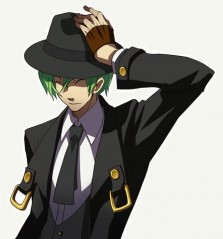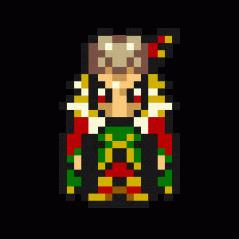You’ve walked a thousand miles, slain a million foes, and finally, the world is safe. It’s okay to lay down your sword, because justice has been served, and evil has been slain. And then you hear someone clearing their throat. This is the Magnificent Bastard, and they’re about to break some bad news. That quest you went on? Not quite so just as you’d thought. That MacGuffin you destroyed? It was the only thing holding him back. And now this guy, who has been subtly manipulating you this whole time, is ready to start his own reign of terror. And it’s all thanks to you.
The Magnificent Bastard is the (wo)man with the plan who doesn’t tell anyone about it. He’s the old man who was behind it all along, he’s the ally who was playing you for a fool, and when it’s all over, you’ve been playing right into the Magnificent Bastard’s hands. It’s not the most common role, because it takes good writing- you can’t write a clever, scheming character if you can’t write clever schemes. But when you see a Magnificent Bastard- and you often won’t realize that they are one until nearly the end of the game- you know shit’s about to get real. Real awesome.
This is not a top ten, and this is not a list in any particular order… it’s just five brilliantly manipulative characters who deserve a little time in the spotlight for all their hard work. It should be rather obvious, but this list contains spoilers for some games- specifically, Persona 4, BlazBlue: Calamity Trigger, and Knights of the Old Republic 2.
Near and dear to my fighting game heart is Captain Hazama from BlazBlue. Master manipulator and king bastard, Hazama is one of the few who is aware of the Groundhog’s Day time loop that everyone is caught up in… and uses that knowledge to turn best friends against each other, break a little boy’s spirit, and even, in one particularly glorious sequence, usurp another character’s monologue.
By the end of the game, the man who spent so much time convincing his subordinates that he’s something of a coward has taken on three of the most powerful entities in the world at once, and thrashed them without breaking a sweat. Even with the majority of the cast out for his blood, he survives and thrives for two games, and looks to be quite well for the inevitable third. That is some expert puppetry.
Persona 4’s Adachi, too, plays the coward despite his eventually revealed true nature. A member of smalltown Inaba’s police force, the bumbling detective accidentally gives away vital clues about the conversation, forgets to catalog evidence, and leads the investigation down numerous false trails. At the end of the game, however, it becomes clear that these efforts were intentional and malicious- Adachi is, in fact, a serial killer, and he uses his position within the police to obscure his own trail.
His shift from innocent goofball to sociopathic schemer is stunning, and yet somehow quite believable- excellent writing and voicework sell us on this self-absorbed, empathy-less killer who does not accept responsiblity for his actions, and finds the attempts to bring him to justice amusing. That this man was welcome into your house as a guest suddenly seems revolting, and it gives the entire game new context.
While all of these mental chessmasters are clever characters, there’s no law that says they have to be sane. Final Fantasy VI’s Kefka is absolutely mad, his sanity the price he paid to gain his immense magical power. He really puts the “bastard” in magnificent bastard, too- his plans have no regard for decency or morals. When the quarry he is pursuing goes to ground in the desert castle of Figaro, Kefka quickly tires of diplomacy, and instead attempts to burn it down. When the siege of Doma takes too long, he simply poisons the keep’s water supply, leading to the death of all but two residents.
That’s not to mention his inventing a device called the Slave Crown (it does exactly what you’d think), and his enslavement of nearly every Esper, harnessing their magical power to his own ends. Kefka isn’t a particularly likeable guy, but it’s hard to deny that he got shit done, through a mix of clever if evil planning, and willingness to do what others weren’t.
I don’t mean to suggest that women can’t be manipulative badasses in their own right- Disgaea’s Etna not only has the cast dancing to her tune, but she’s blatant about it, never pretending to be doing anything but tricking others into doing what ultimately benefits her. After maneuvering her boss into the throne of the Overlord despite all odds, she decides he’s not doing a good enough job, and strikes out on her own.
From then on, she appears in every Disgaea game, always as a powerful boss- commanding an army of seemingly endless Prinnies, the suicidal demonic penguin foot soldiers of hell. After beating her in any of the main Disgaea titles, she joins your party- but on her terms. You are working for her now, not the other way around, and she makes that clear. Surpassing even the popularity of her game’s protagonist, it’s hard not to be impressed with Demon Lord Etna.
No list of manipulators, however, would be complete with Kreia from Knights of the Old Republic 2: The Sith Lords. A standout in a game full of liars and deceivers, the Lord of Betrayal has both friend and foe dancing to her tune, and indeed it is hard to tell which is which. The Sith Lords that oppose the party are her former students, merely doing what she has taught them to do, and the party is a motley crew held together by the leader’s charisma, and Kreia’s threats. She takes the time to ensure that several party members stay loyal… or suffer the consequences.
When she betrays you near the end of the game, it is shocking, but you also feel like perhaps you should have seen it coming- the woman who trusts no one, and knows far, far too much was obviously only using you for her own gain the whole time. It was mere convenience that had her following up until now… or was it? Because as the curtain falls, as you best the Dark Lord in her home, and her life fades away, she tells you that she is proud of you. And in the end, you find yourself no closer to understanding the game’s most complex character in a title full of deep characters.
As much as KotOR 2 appears to be about the Jedi Exile, the player character, it is really about Kreia- about her struggle with light and darkness, about her resentment of the power that she holds, and about her overwhelming ambition. And in the end, as much as we have learned about her, we feel like there is so much more to her that we will never know. That is what makes her such a great character- not the simple fact of her brilliant, manipulative nature, but that she feels like a real person. That she’s not a caricature drawn up for the purpose of the plot, simply to fill a hole, but far larger, with details that like any real person, we will never understand.
The thing that is so incredible about the Magnificent Bastard, other than their usual charisma and brilliance, is the way they can make you question player agency. Suddenly, those quests you completed for him weren’t you acting on your own initiative, it was the Bastard making you dance to his tune. For gamers so used to absolute control of their games, it’s a thrilling thing when done properly- the overwhelming reaction to Bioshock’s Bastard twist is proof enough of that. The Bastard is there to remind us that the best thing in a game isn’t when things go exactly as planned- it’s when a game manages to surprise us. Those are the moments truly worth remembering.




